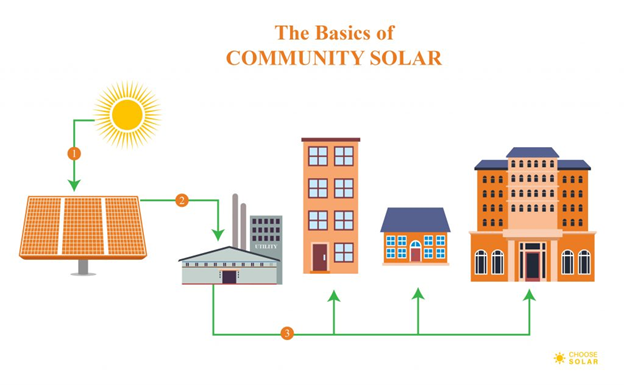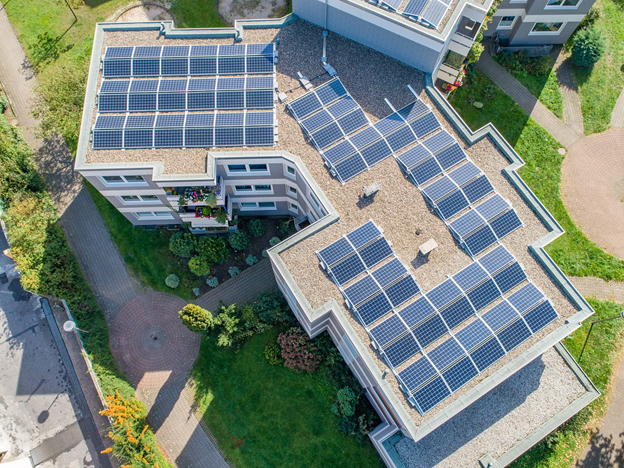The little-known program called community solar for businesses is a perfect way to save both money and the environment without any upfront costs and time-consuming installations by simply subscribing to a local community solar farm in your area. Community solar for small businesses is free to join, free to maintain and free to cancel. By subscribing online to community solar, businesses would get a guaranteed 10% discount on their electricity bills and reap all the benefits of saving the environment.
In the 2020s, many companies across the United States are looking for ways to adopt more environmentally friendly business practices. Whether they are trying to meet emissions goals set forth internally, down the supply chain, or by local communities, many people speculate that joining the green revolution is key to ongoing success this decade.
For small businesses, there are a handful of ways to make day to day and overhead procedures more sustainable. Today, advancements in technology and related infrastructure have made solar energy more attainable than ever. With this, solar capacity in the United States has risen dramatically in the past 10 years, with panels added to homes, businesses, and utility energy portfolios nationwide.
While some small businesses do not have the property or capital for onsite installations, community solar partnerships can be established to give business owners similar opportunities to adopt a green energy solution. In doing so, businesses can reduce their carbon emissions with the added benefit of stabilizing or lowering their electricity expenses. In this comprehensive guide, we will define community solar and analyze the pros and cons of adopting it as a small business owner. In doing so, we hope to shine a light on a new way to power small businesses across the country.

What is Community Solar?
To kick things off, let us take a step back and first define the term “community solar.” While it is a relatively new concept, community solar is growing rapidly both domestically and around the world. Simply put, community solar is an alternative to traditional utility electricity, in which participants draw their electricity from a remote PV solar installation.
Community solar can be referred to in several ways, with monikers that include:
- Shared Solar
- Solar Farms
- Solar Gardens
- Community Solar Farms
- Roofless Solar
- Energy Sharing Farms
- Virtual Net Metering
- And more
No matter what you call it, the idea is relatively simple. Although it is not available everywhere in the country, installed solar capacity is increasing as more states are adopting policies that allow for shared solar farms to be constructed and used. For additional background information, feel free to take a look at our guide to community solar.
Why Should Small Businesses Use Community Solar?
Now that we have defined what we are talking about, let’s take a look at the current state of community solar for businesses in the United States today. According to a recent Wood Mackenzie study as covered by Forbes, only approximately 1% of the commercial buildings in the United States are currently using some form of community solar for their electricity.
With a pool of about 850,000 buildings in total, this can be represented as about 85,000 companies using community solar programs across the country. While this number may seem like a lot, there is still enormous potential for the space to grow in the 2020s.
Small Businesses are the Ideal Community Solar Partner
Today many factors make small businesses the perfect partner for local community solar projects. Depending on the type of business, electricity may be one of the largest operating costs, and community solar projects are designed to lower and stabilize these expenses. While many large businesses are installing their own solar energy systems, small businesses rarely have the upfront capital or physical property space to accommodate a large installation.
Here, community solar projects open the doors for small businesses to lower their costs and carbon emissions without having to drastically change the organization’s day to day operations or capital spending.
Small Commercial Businesses Who Can Benefit the Most from Community Solar
While community solar participation can work well for both residences and businesses across the country, there are a few attributes of specific businesses that may qualify them for the maximum benefit. The following are all examples of why a small business should explore the option of community solar against traditional utility energy or an onsite PV installation:
- Companies with large electricity costs
- Businesses in a shared building with other tenants
- Organizations that rent office or factory space
- Companies with minimal roof or property space
- And businesses looking to lower their carbon emissions
By generating clean, renewable energy offsite, community solar projects allow organizations to join the green revolution no matter what kind of space they do business in. For small businesses located in high rise office buildings or rented warehouse space, community solar may be the only option for adopting renewable energy.

How Does Community Solar Work for Small Businesses?
Community solar projects come in a variety of forms, with participation sometimes limited to specific homes or electricity users. If a business fits within the designated region, community solar projects typically accept participants in either a purchased or leased role. While up and running solar farms may have designated partnership levels, community solar developers are generally flexible in their business models, especially during the early stages of the project.
No matter the payment structure, community solar does not typically affect a company’s operation in any way. Purchased or leased solar power from community solar projects are credited towards a business’s electric bill, reducing the monthly statement. Community solar participants typically have a lot of control over their subscriptions and can easily compare electricity kWh rates against ordinary utility spending.
Owning vs Leasing Commercial Community Solar
Typically, community solar participation is offered in an ownership or leased (subscription) model. In an ownership model, small businesses can “purchase” a portion of a larger solar array with the ability to claim the electricity the panels create throughout their lifetime. While most companies typically do not have the upfront capital for such a large purchase, some organizations offer flexible finance options for purchasing their power.
In the long run, an ownership model will typically see a higher return on investment for community solar participants. With that said, this option is less common than the subscription model, and may not be available for existing projects.
In a subscription model, small businesses can “lease” their energy from a community solar garden. Here, there is considerably less risk than purchasing panels, and companies are still able to reap the financial and environmental benefits from their participation.
Pros of Community Solar for Small Businesses
Speaking of benefits, we will now take the time to outline some of the distinct advantages of community solar for small businesses in the United States.
Meet Sustainability Goals
More than anything, community solar is one of the easiest ways for small businesses to meet sustainability and emissions goals set forth internally or by the local city or state. Today, more and more communities are setting 100% renewable energy commitments, with many large corporations following suit to ensure a better global future.
Even if a small business has not set its own sustainability goals, there is a large chance that another company within the supply chain has set its own. With this in mind, companies that adopt green energies are more likely to attract sustainability-conscious customers and vendors. As community solar is generally a turn-key solution, this makes it a quick and easy option for going green.
Stabilize and Reduce Electricity Costs
While the environmental benefits are obvious, reductions and stabilization of electricity costs are the primary reason why a community solar project is an attractive option for small businesses. While traditional utility rates tend to increase over time, they also vary throughout the year and time of day in some areas. Community solar purchases and subscriptions allow small businesses to know exactly the rate they will be paying for each and every kWh purchased.
With stabilized rates in place, small businesses can more easily budget for annual electricity expenses. If a business chooses to pursue a purchased model, then a community solar investment can even turn electricity into a long term fixed-cost asset, rather than a variable monthly expense.
No Upfront Costs or Ongoing Maintenance
Community solar is incredibly easy for small businesses to adopt, and even easier for them to continue to use. Whereas onsite PV installations may require maintenance and upkeep, community solar programs are generally turnkey solutions that do not require much time or effort.
In a subscription model, involvement in community solar can be both instant and painless. Whereas some paperwork must be completed, businesses rarely have to pay upfront costs to begin saving on their electricity expenses each month with a shared solar garden.
Flexible Options Available
As we alluded to earlier, community solar gardens can be open to flexible financing and purchasing options for participation in the renewable energy project. Moreso, subscriptions can often be bought in specific amounts of energy, particular dollar amounts, or for predetermined periods. With a variety of solutions available, businesses should have no issue finding a community solar option that fits the needs of their organization.
No Need to Change Daily Operations
Lastly, it is important to understand that community solar is one of the least invasive and easiest ways to adopt renewable energy in the United States. As nearly everything is handled “virtually,” small businesses rarely have to change any of their daily operations to begin their participation in a community solar program. If a community solar program is beginning in your area, then there are likely very few barriers to entry.